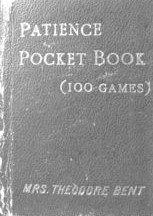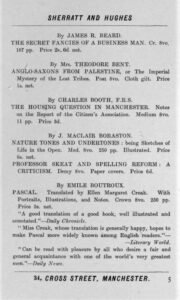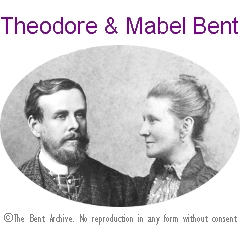 A patience pocket book: plainly printed (1903/4, Bristol: J.W. Arrowsmith & London: Simpkin, Marshall, Hamilton, Kent & Co. Ltd.). A tiny volume of card games; we know Mabel and Theodore took cards with them to help pass tedious moments.
A patience pocket book: plainly printed (1903/4, Bristol: J.W. Arrowsmith & London: Simpkin, Marshall, Hamilton, Kent & Co. Ltd.). A tiny volume of card games; we know Mabel and Theodore took cards with them to help pass tedious moments.
What the reviewers say: “Patience Pocket Book. A hundred games put together by Mrs Theodore Bent (Simpkin, Marshall, Hamilton, Kent and Co., London; J. Arrowsmith, Bristoi). 1s. —Bridge may come Bridge may go, but depend upon it, Patience goes on for ever, or, at all events, will for a very long time. This clever little book, just 3 inches by 2 inches, should find a place on every drawing-room table, and in every travelling bag when starting for abroad. The preface describes the principles on which the details of the hundred games are condensed into few words, and the rules and abbreviations are so simple that a child could easily compass them. The result is that the several kinds of Patience are described in as few words as it is possible, and the selection is a most excellent one. At hotels at home and abroad you see people with their Patience boards, devoting their evenings to the game; and here is a friend and companion that will make the players acquainted with many sew variations, and give plentiful amusement. Mrs Theodore Bent is wont to do what she undertakes well, a fact that this little book amply proves.” – The Queen, the Lady’s Newspaper (Jan. 16, 1904, page 105).
 Anglo-Saxons from Palestine; or, The imperial mystery of the lost tribes (1908, London: Sherratt & Hughes). After Theodore’s death, Mabel, distracted, absorbed herself in various odd causes, including the bizarre, sinister and still active British-Israeli movement. She contributed this misguided volume – it is absurd and, fortunately, almost impossible to read or obtain today. What we can show you for now is the strange book’s announcement in British Birds for Cages, Aviaries, and Exhibition, by Sumner W. Birchley, published by Sherratt & Hughes in 1909.
Anglo-Saxons from Palestine; or, The imperial mystery of the lost tribes (1908, London: Sherratt & Hughes). After Theodore’s death, Mabel, distracted, absorbed herself in various odd causes, including the bizarre, sinister and still active British-Israeli movement. She contributed this misguided volume – it is absurd and, fortunately, almost impossible to read or obtain today. What we can show you for now is the strange book’s announcement in British Birds for Cages, Aviaries, and Exhibition, by Sumner W. Birchley, published by Sherratt & Hughes in 1909.
What the reviewers say: “The late Mr. Theodore Bent was a most intrepid traveller and on most, if not all of his Expeditions he was accompanied by his wife. During their wanderings in Southern Arabia, the Sudan and Sokotra, the latter seems to have brooded on the question of the lost Ten Tribes, and the result of such meditation is now recorded in a little book, written mostly in Jerusalem, entitled: Anglo-Saxons from Palestine, or the Imperial Mystery of the Lost Tribes. The conclusion to which Mrs. Bent has come is that the lost tribes are to be found in Britain. She says: ‘The Ten Tribes are undoubtedly somewhere on the face of this earth, and if they are not the British who are they ? Try to fit the description on any other nation, and you fail’. Mrs. Bent has been much impressed by the writings of Mr. Edmund Hine on the subject, but, though, like him, she quotes a multitude of verses from Holy Writ, we cannot see that she has proved her contention.” – Luzac’s Oriental List and Book Review Quarterly, Vol. XX, 1909, pp. 115-116.
“Mrs. Theodore Bent has done such good work in exploring the lesser-known parts of the earth, that it is a pity to find her wasting her energies in pursuing the will o’ the wisp of the Anglo-Israelite theory. It would be unkind to criticise this little work, which merely follows the accepted type of books of its class, in straining the meaning of obscure prophesies to defend a position for which sober history gives hardly any support. We need only criticise one remark, “As the House of Israel is not amid the House of Judah at the present time,” says Mrs. Bent, “it must necessarily be somewhere about in the world.” Surely the author is aware that tribes, nations, and States have died out altogether more than once in the annals of the world; her “necessarily” is, therefore a non sequitor.” – The Globe Literary Supplement, 6 January 1909.
 The Garden Tomb, Golgotha and the Garden of Resurrection (with Arthur William Crawley-Boevey and Miss Hussey (c. 1920, Jerusalem/London: Committee of the Garden Tomb Maintenance Fund). In a way associated with the above, and, again, deriving from the decade or so Mabel spent visiting the ‘Holy Land’, this little guide to the ‘Garden Tomb’ is aimed at like-minded visitors to the site, for which there is little, if any, archaeological evidence.
The Garden Tomb, Golgotha and the Garden of Resurrection (with Arthur William Crawley-Boevey and Miss Hussey (c. 1920, Jerusalem/London: Committee of the Garden Tomb Maintenance Fund). In a way associated with the above, and, again, deriving from the decade or so Mabel spent visiting the ‘Holy Land’, this little guide to the ‘Garden Tomb’ is aimed at like-minded visitors to the site, for which there is little, if any, archaeological evidence.
